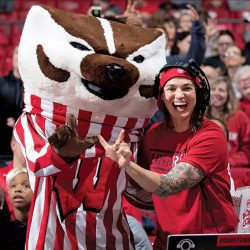Pat Richter ’64, JD’71
To some Badgers, Pat Richter is remembered as the star of one of the most exciting football games ever: the 1963 Rose Bowl, which the Badgers lost 42–37 after a furious fourth-quarter comeback fell short. To others, he’s known for transforming UW–Madison into a sports powerhouse. When he became athletics director in 1989, the program had a multimillion-dollar deficit. He led an effort to hire coaches and build facilities that made the Badgers a national force. Richter retired in 2004 but has kept an active eye on the UW.
Vince Lombardi was one of your coaches. What did you learn from him?
I played for Lombardi for just one year, in 1969 [with Washington], but he taught me what it means to be a professional. I had a job to do, and if I did my job — if everyone did their jobs — we would be a successful enterprise. Now, football is just a game, but that outlook carries over to other, more important things: businesses, police and fire departments. Don’t just think about yourself. Think professionally about how your job fits with other jobs, and the enterprise will succeed.
After you left football, you became an executive at Oscar Mayer, but then you returned to athletics at the UW. How did that experience shape you?
Well, Oscar Mayer, athletics — you’re dealing with hot dogs at either place, aren’t you?
But did it affect the way you worked at the UW?
One of the things I brought with me to the UW was the belief that motivation is key. What motivates a coach or anyone else to be successful? I looked for people who were motivated by more than just financial reasons, and not people who looked at the job as a stepping-stone. [Basketball coaches] Dick Bennett, Bo Ryan — they had strong personal connections to Wisconsin. I looked for people who wanted to bring respect and a tradition of success to the UW.
And you recruited in similar ways as vice president of personnel at Oscar Mayer?
I often recruited from the UW because it provides future leaders. I remember talking to somebody who actually was getting a PhD in music (piano). Yet they wanted to be a salesperson at Oscar Mayer. And because of the breadth of their education, it turned out that they were perfectly qualified to do that and be very successful.
In retirement, you’re still involved with the university. What causes do you support?
[My wife] Renee and I have been targeted in our support, but Alzheimer’s is one area. It’s taken on a bit more meaning because of what’s happening with football players. You know, Lou Holland [’65] was a friend of ours. He was a teammate, and [years later], we’d see him at games, but unfortunately, that’s when he started having problems with dementia, and you could see him beginning to slip, and it was very sad to see him. Week to week, almost, a couple weeks between games, you could see his deterioration. He was a great teammate and friend who accomplished great things.
What makes the UW so special to you?
I think there’s a certain cultural aura about the University of Wisconsin. Obviously, it’s a huge school, yet with the wide range of things that you can experience, from athletics to academics, social activities, the Union, Hoofers — it’s not like this anywhere in the world.
Interview conducted, edited, and condensed by John Allen
Published in the Fall 2018 issue




Comments
William (Bill) Macy December 29, 2023
I went to Madison East High School when Pat played football there. I went to to UW Madison when Pat played in the Rose Bowl. My sister married Billy Smith who played in the Rose Bowl with Pat. BILLY was a defensive back and suffered a broken jaw tackling Hal Bledsoe in that game which Wisconsin almost came back in the 4th quarter. After graduating from Wisconsin I entered the corporate world in the New York/New Jersey area eventually becoming a regional manager in Florida.
Jim Meehan September 9, 2025
Mr. Richter is the real deal. When I was very young my dad past away. I remember my mom taking me over to Mr Richter’s parent’s house to meet Pat Richter. Richters were friends of my cousins, Billy and Brady Farrell. At the time, Pat was recovering from knee surgery. He was playing for the Redskins at the time. Pat invited me in to the house and with some encouragement showed me some of his many awards. He later sent me autographed pictures of other Redskin players. It meant a lot to a young guy with no dad.